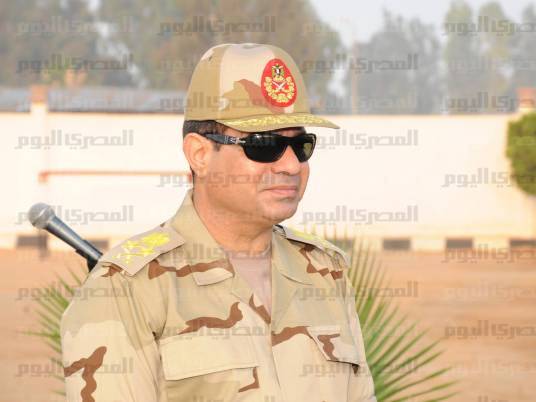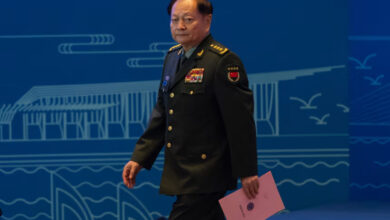
Since the ouster of former President Mohamed Morsy by the army amid mass protests against the Brotherhood, some critics have raised concerns that Egypt’s military may be pushing to consolidate its power and undermine much of the democratic process. “It is too soon to be talking about [a military state], right now. No speculations could be made before the draft amendments are discussed,” George Isaac, political activist and co-founder of Kefaya opposition movement, told Egypt Independent. As the committee of 50- entrusted to amend the constitution headed by Amr Moussa- starts its sessions, some like Tharwat Badawi, constitutional expert and professor of constitutional law at Cairo University, express their dismay that it was a committee "chosen by the military-appointed interim president".
“The committee was appointed by an unelected president. It is impossible to put a democratic constitution without a democratic constituent committee,” Badawi told Egypt Independent. He added that a non-democratic process is not expected to yield a democratic result that Egyptians aspire to.
“This committee should be elected by the people, under a sound electoral system guaranteeing all freedoms; political, intellectual, personal, social and economic.” However, some believe that elections in current-day Egypt are not a grantor of true representation of the people or at least of their best interest.
Talaat Mosallam, security analyst and retired major army general said: “[The constitutent assembly] drafting the constitution does not have to be elected. The most important thing is sincerity.”
He added that the constitution will be put to referendum which “will manifest people’s will, whether the committee members are elected or not.”
Constitution-backed military trials
Military trials for civilians were never enshrined in any previous Egyptian constitutions, including Mubarak’s 1971 constitution, but army leadership lobbied for its inclusion during discussions of a new charter.
Article 198 from the now-suspended 2012 constitution, originally gave the army the right to try some civilians. The article of interest read: “Civilians shall not stand trial before military courts except for crimes that harm the Armed Forces. The law shall define such crimes and determine the other competencies of the Military Judiciary".
Article 198 was not included in the amendments proposed by the committee of ten, which was an alarming sign to human rights activists. However, The Political Regime Committee, in the current committee of 50, has witnessed a prolonged discussion this week between its members and the representatives of the armed forces, in which, Amr El-Shobaki, former parliament member and columnist, asked army representative, Magdy Barakat, to present a clear vision of the regulations upon which military trials should be applied.
The army has stepped up military trials for civilians since 25 January. Although the Egyptian army has been regarded as the “champion of the January revolution” that called for bread, freedom and social justice, there were early signs the army may be undermining Egypt’s move from dictatorship to democracy.
For example, the army has time and again defended its right to try certain civilians who commit crimes that concerns its brass in military courts.
The latest of these trials were of 57 civilians in Suez facing charges of assaulting military personnel, torching armored personnel carriers and attacking military constitutions.
Only last week, journalists Ahmed Abu Deraa, Al-Masry Al-Youm reporter in Sinai, and later Emad Sayyed Abu Zeid of Al-Ahram, were referred to military court on charges of "spreading false news about the armed forces".
Abu Zeid was charged with deliberately reporting false news to Arab and Egyptian news agencies about the internal situation of the country as well as the army’s counter-terrorism operations in Sheikh Zuwayed, North Sinai.
According to a 2012 report by grassroots campaign ‘No Military Trials for Civilians,’ fighting against military trials for civilians is a daunting task to begin with and would become much more challenging if the military’s right to try civilians was enshrined in the constitution.
"Not only does the article clearly leave broad discretion for military courts to try civilians," stated the report, "but it is purposely vague, leaving all options open for legislation, without in any way limiting the military justice system’s overly broad jurisdiction as set out in the existing law, the Code of Military Justice, which allows for civilians to be tried if one of the parties involved is a military officer or if the crime takes place in an area where the military is deployed. This has allowed for unfair trials of civilians for acts as inconsequential as ‘insulting’ a military officer."
In the months following the outbreak of the Egyptian revolution on 25 January, around 12,000 were arrested and tried by the Egyptian army, according to Human Rights Watch. This number is larger than the total number of civilians subjected to military trials during president Mubarak’s 30-year rule.
Although military commanders were later forced under public pressure to release most of their civilian prisoners, army representatives in the 2012 constituent assembly lobbied successfully for the right to try some civilians.
Mamdouh Shahin, Assistant Defense Minister for Legal and Constitutional Affairs and representative of the military in the 2012 Constituents Assembly strongly defended the article, in one of the assembly sessions back in November 2012, emphasizing the importance of trying civilians, who have committed crimes against military personnel and properties, before military courts. Shahin also added that “the army doesn’t want civilians to be tried before military courts, but the country’s interest comes before civilians interest.”
No For Military Trials For Civilians mentioned Qursaya island, where 25 residents faced military trials on charges that included encroaching on army-owned property and being present in a military zone, as an example. Charges that directly contradict a civilian court ruling from the Court of Administrative Justice in 2008, affirming the island residents' legal right to live on the island and farm it, stated the report.
“The fact that the military is evicting people, arresting civilians, and bringing them before military courts is a serious challenge to civilian rule” said Joe Stork, deputy Middle East and North Africa director at Human Rights Watch, commenting on the incident in a Human Rights Watch report in November 2012. “Egypt’s Constituent Assembly should once and for all put an end to military trials by enshrining in the constitution that the military has no power to detain or try civilians.”
Military sources, however, justify the inclusion of article 198 saying that it is necessary to have a judiciary system that could look into crimes committed against the armed forces and evaluate the “intensity of the crime”.
“The civil justice system would not be able to do such an evaluation,” he told Egypt Independent. “No one asked for civilians to be tried before military courts for any other reason.”
Minister of Defense appointment
For critics, another amendment proposed to the 2012 constitution by the committee of ten is a new article that further guarantees the independence of the armed forces from the state.
In a new constitutional precedent, article 170, which stipulates that the minister of defense should not only be approved by the Supreme Council of Armed Forces as stipulated in the 2012 charter, but must also be a member of the armed forces and not a civilian.
Badawi described the proposed article, 170, for the new constitution as “catastrophic” because “it would turn the armed forces into a state above the state.
He explained that the political system in this case will not be democratic because the defense minister must be chosen by the cabinet, whether in a presidential system or in a parliamentary system, limiting and possibly nullifying the decisions of any elected president.
“As long as neither the president nor the prime minister are able to choose the minister of defense, then this minister of defense might as well be representing another state,” he added. “How could there be a Defense Minister appointed by someone other than the head of state?”
The only article in an Egyptian constitution that ever mentioned any special criterion for the minister of defense, or any minister for that matter, was article 171 in the 1956 constitution which stipulated that the army’s Commander-in-Chief “could” serve as the minister of defense, thus leaving the door open for civilians to hold the post.
While many critics questioned the fact that the new article limits the position to military officers, Mosallam believes that it does so for vital reasons.
“The position of defense minister should strictly be a military position as it deals with issues such as preparing for war,” Mosallam told Egypt Independent. “The responsibility of war, as well as issues related to officers’ morale, shouldn’t be given to someone who is not specialized in the matter. These are matters that cannot be provided by a civilian as they need experience.”
Mosallam added that civilians acting as defense ministers "have not achieved anything in Egypt or elsewhere in the world."
Army above the state?
A recent decree by interim president, Adly Mansour, changing the language of the pledge of allegiance, heightened critics' fears that the army could be setting itself above all state institutions.
Mansour’s presidential decree, number 552 for the year 2013, no longer requires army officers to swear allegiance to the president as indicated in the nullified version of the constitution.
According to Badawi, this decree comes as the latest of a series changes and amendments to the constitution, that may be considered as laying grounds for military statehood, ever since the army forced former president Mubarak to step down.
The new oath states: “I swear to God Almighty to be a loyal soldier to the Arab Republic of Egypt, to keep it safe and secure, to defend it on land, in sea and air, inside and outside the republic, to obey military orders, to carry out my [military] leaders’ orders, to maintain my weapon and not to leave it until I die.” This means that military officers won't hold any loyalty to any future ‘elected’ leader, according to critics.
Military personnel, however, argue otherwise.
“I don’t think it makes any difference,” Mosallam said, “What about the army officers who have already sworn loyalty to the president? Does the new oath exempt them from what they swore to? I don’t think so.”
He added that, as a former military general, the military’s “loyalty was never to the president [a person] but to Egypt and the Egyptian people.”




